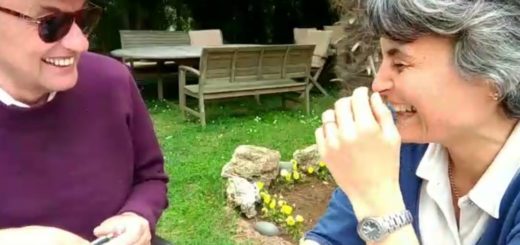How To Find Wholeness With Your Shadow, Develop Secure Attachments and Build Self-Esteem
For a while now that I have been writing about the importance and methods of becoming integrated with the unconscious; and especially our shadow which covers those aspects of us that we cannot accept. This week I’m going to discuss the subject of finding wholeness with your shadow as it appears within relationship issues. These are opportunities for developing more secure attachments and greater self-esteem.
Developing Self-Esteem with Your Partner
In adult life, it is our partner who knows us best. That is why, the most important added-value of a relationship is to give and receive constructive criticism, mutual support in order to overcome personal challenges, and in turn help you develop self-esteem.
Think about 3 subjects, situations or traits that would be good for your partner if s/he were to change. Let’s say your partner’s habit of delaying things, sensitivity and self-neglect. This can be spoken out in a constructive manner like this: ‘I observe that you become miserable and tense whenever you delay things.’ ‘It seems that your sensitivity makes you socially withdrawn.’ ‘I admire your ability to work in multiple fields. But have you ever considered the benefits you may gain if you can keep this at a level that you don’t have to neglect yourself?’
The next step is to talk about the advantages and disadvantages of changing or keeping these behaviours in your partner’s life. By doing so, it becomes possible to experience a conversation about the relationship without getting stuck concerning the content.
Wholeness with Your Shadow Reduces Stress
Feelings of helplessness reduce when you and your partner realise that your problems exist in order to heal the past and help you face up to whatever you cannot see by yourself and cannot overcome.
Inner and outer worlds are parallel, they mirror each other. How do the couples express their needs and how they react when these needs are not satisfied?
Even if you think you know each other’s positive and negative trigger buttons, can you avoid purposely pressing them when you are mad or heart-broken? Over and above, people become aggressive about even the most casual requests when their needs are not seen and satisfied?
Self-Defences
In psychology, ‘self-defence’ is a concept we sometimes discuss. One of the reasons for ‘self-defence’ is to protect our ego in an attempt to maintain our self-esteem. Another reason is to avoid living the painful experiences over and over again, and to control and avoid those powerful and threatening emotions such as sorrow and anxiety.
In fact, self-defences may be healthy reactions to some extent since they sometimes help us protect our wholeness. When they so we may refer to them as ‘stabilisers’ rather than defences, which are reminders of war.
The need of therapy emerges when such stabilisers become harmful to us and also to our relationships. In other words, your essential self gets stuck with the behaviours these stabilisers habitually elicit. When this happens you will live a life without knowing exactly what you want. After a while the shadow rises up to disrupt life.
Problems arising between couples frequently point to self-work that can be done. When couples cannot realise this fact and act from the primitive lizard-like part of the brain ‘fight or flight’ responses become activated. While ‘fight mode’ includes various hurts such as sarcasm, insinuation, destructive criticism and exclusion; ‘flight mode’ may be in forms of frequent avoidance, withdrawing, being offended or closed for communication.
When in therapy, couples enter into the process of metamorphosis, both as individuals and jointly. The goal is to connect people to their whole being. This is the only way to become maturely attached and independent within a couple relationship.
Healing the Past and Secure Attachment
The problems we have with our opposite-sex parent (sometimes same-sex) re-arise in our intimate relationships. We either are drawn toward those with similar traits, or we stay on alert in case those traits emerge, or we put in extra effort to prevent such behaviours from occurring. This, of course, is doomed to failure. Typically, the result is to experience exactly these problems in the relationship. There are many reasons lying beneath a relationship’s surface; one of them gives us a healing opportunity by providing us with a different experience in a similar setting.
In our relationships, we are inclined to experience the feelings that are similar to those we had in our childhood towards our opposite sex parent. This situation mostly progresses in a circular pattern including an avoidance reaction of helplessness, anger, abuse, withdrawal or drifting apart, or even cheating. When we understand some of the perspectives discussed here, a space is created for us, making it possible to have a different point of view. We are adults now and the person at stake is our partner. While realising that we do not have to feel helpless and impotent, enables us to choose our actions proactively before reacting. Thus we start to connect lost pieces of our childhood allowing letting the puzzle heal us.
Trauma increases in cases where such healing cannot take place. If you watch my Youtube videos of preventing husband-wife fights and then identify your respective attachment styles, you may become clearer about what you can do.
Couples Therapy
Couples therapy is a process of getting to know yourself and your partner, and working supportively with each other. Whenever people face challenges, my advice to couples is to consider evaluating their processes as opportunities to know themselves and each other better. There is no need to take offence. The process can be approached with a sense of wonder.
No matter how hard it may be, the right attitude can lead from an acceptance of the shadow and toward wholeness. It is always healthier and more constructive to approach your relationship with the question ‘To what extent we can be more flexible for each other?’
Invitation: Self-Esteem Workshops
Finding harmony in relationships goes hand in hand with individual wholeness and happiness. While people with higher self-esteem find harmony in their relationships easier, couples in harmony can increase each other’s self-esteem. The path is to focus on working on you without losing time with needless accusations and petty sensitivity.
In the autumn of 2016 I will be offering a series of workshops on self-esteem. Before then I can send you more valuable tools to help you increase your self-esteem and achieve autonomy in your life. If you are interested in benefiting from these register to my email list here and let’s stay connected.





